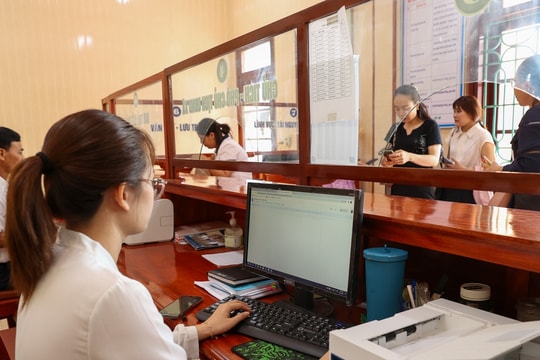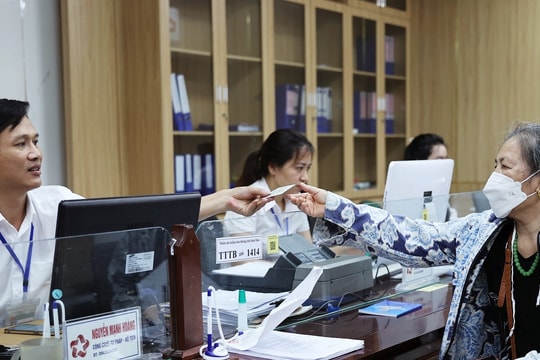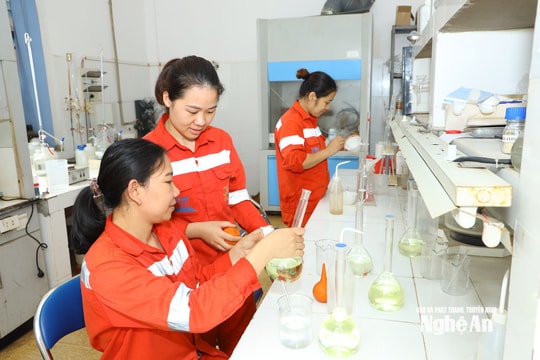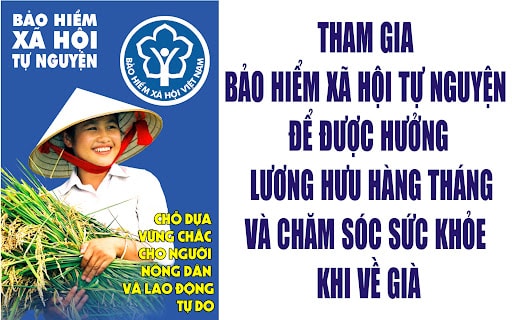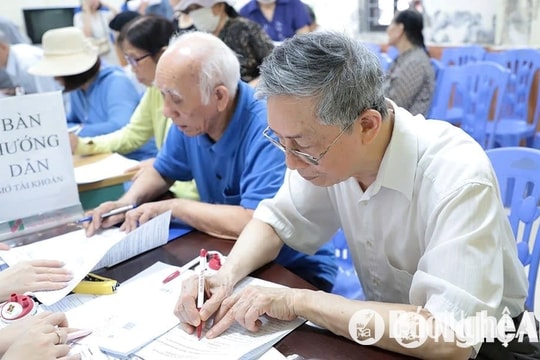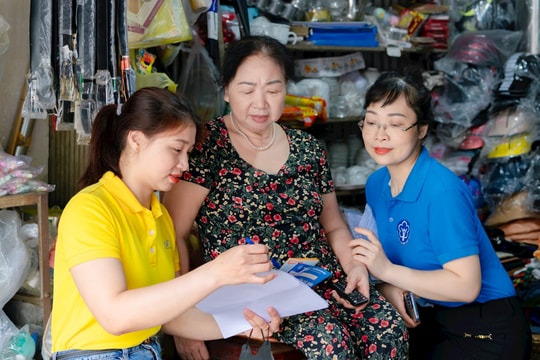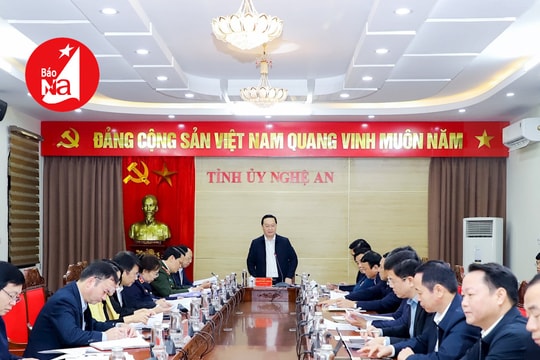Exported workers must pay compulsory social insurance: Many concerns remain
(Baonghean)- The Government has just issued Decree 115/2015/ND-CP detailing a number of articles of the Law on Social Insurance on compulsory social insurance, effective from January 1, 2016. The subjects of application include Vietnamese workers working abroad. This information has made many workers and labor export recruitment units worried.
Many concerns
Mr. Phan Bui Quoc Thang (Le Mao, Vinh City) has many years of experience exporting labor to many countries in Asia. After 4 years and 10 months of working in Korea, he is currently returning home to visit his family and waiting to sign a contract extension to continue working in the neighboring country, according to the bilateral cooperation regulations between Vietnam and Korea on labor export. Talking to Mr. Thang about Decree 115/2015/ND-CP, he said that he learned about this decree through the Electronic Information Portal of the Ministry of Labor, War Invalids and Social Affairs.
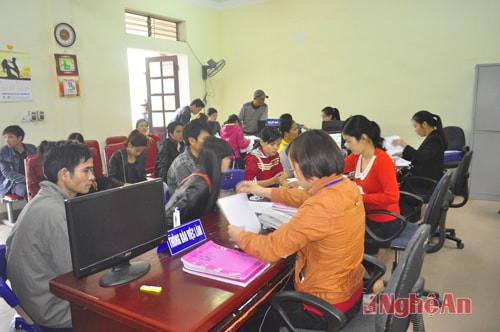 |
| Register for overseas labor export at the provincial employment service center. -Photo:Minh Quan |
“Personally, I feel excited about the provisions of Decree 115 on labor export. Because the biggest worry of workers going abroad is that after their labor term expires, when they return home, their future is very uncertain. Decree 115 stipulates compulsory social insurance contributions to resolve this concern. If I comply properly and fully, after returning from working abroad, I will still have a pension like everyone else,” said Phan Bui Quoc Thang. However, Thang also expressed his concern that he did not clearly understand the contribution level, payment period, and specifically the benefits of workers going abroad when participating in compulsory social insurance. “I read the newspaper and consulted information from many sources but I still have a vague understanding. I hope the Insurance and Labor sectors will have specific instructions and advice for workers going abroad like us,” said Thang.
But not all workers are as excited as Mr. Thang. Mr. Le Xuan Vinh (Nam Trung commune, Nam Dan) has completed the procedures to work abroad in Taiwan and is waiting to "fly" to work after the Tet holiday. This is not the first time he has worked abroad, but a few years ago, he had more than 2 years of experience working in Taiwan. After more than 2 years, minus the initial procedure costs, he brought back about 200 million VND in capital. That amount is just enough to renovate the house and buy some basic household appliances for daily life, but not enough to invest in business or production. Therefore, after returning to his hometown for a few years, he has now decided to continue.
When hearing about the regulation that exported workers must carry out compulsory social insurance, Mr. Phan Xuan Vinh could not help but worry: “The income of workers in Taiwan is not as high as in Korea, only about 1/2 or 2/3. I work at Kinh Bang Electronics Company (Taipei), my monthly salary is about 19,900 NTD, equivalent to 600 USD. After deducting living expenses, personal income tax, health insurance... at the company, I only have about 2/3 of my income left, which is about 400 USD. Not to mention having to save money to pay off the initial cost of about 5,000 USD; then when I get sick or have risks in the host country, I don't know who to rely on, I have to spend a large amount of money to cover it. Now at home, I have to "shoulder" the compulsory social insurance, I feel overwhelmed."
On the other hand, he is worried that if he pays social insurance in Vietnam, when he has an accident or falls ill in another country, will the insurance in Vietnam cover it? Mr. Vinh said that many of his friends who went to work abroad with him also think the same way, because their income is low, they just want to save as much as possible to bring back home to pay off debts and build a house, not thinking too far ahead about pensions or other insurance policies.
Workers benefit
Mr. Nguyen Phi Long - Head of Employment Department, Nghe An College of Economics and Technology 1 - a labor export recruitment unit said: In essence, social insurance for exported workers is good because it ensures long-term benefits for workers. However, workers going abroad to different countries have different incomes, rights, and obligations in the host country, leading to different conditions for participating in insurance. "Workers going abroad to countries in the Middle East, or Taiwan, Malaysia, Korea, etc. are all insured by the employer. The amount of insurance is paid by the employer and the worker. In some countries such as Japan, for example, employers are not obliged to pay insurance for foreign workers. This difference leads to different needs, desires, and future orientations of workers, so in my opinion, this should not be mandatory, but should only be voluntary social insurance, which is more suitable to reality".
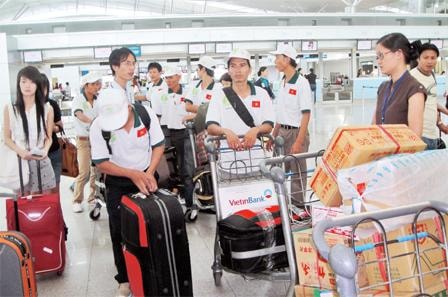 |
| 115,980 Vietnamese workers went abroad to work in 2015 - Illustrative photo |
Sharing the same opinion with Mr. Nguyen Phi Long, many other consulting and labor export enterprises said that collecting compulsory social insurance for exported workers is very difficult. And currently, how much to collect, how to collect, whether recruiting enterprises have to collect and include it in the cost of sending workers abroad, there is no guiding circular, making both workers and enterprises very vague. On the other hand, enterprises are also unclear about what benefits workers will enjoy when participating in social insurance, so it is difficult to explain to workers. Therefore, some enterprises shared that although Decree 115 has come into effect, during the consulting process, they still hesitate to state and explain to workers about the compulsory social insurance regulations.
Discussing the content of compulsory social insurance for exported workers, Ms. Tran Thi Ha - Head of Collection Management Department, Social Insurance of Nghe An province said that this is a superior policy, ensuring social security and in line with the roadmap to expand the number of social insurance participants. However, because it is a new regulation, the propaganda and dissemination to workers and businesses have not been thoroughly implemented. Regarding this regulation, Ms. Tran Thi Ha affirmed that workers should not worry about the fact that after the expiration of their labor term, when they return to their homeland, their social insurance will be "broken halfway". Because when returning home, workers can continue to participate in voluntary social insurance with the level of choice appropriate to their ability so that when they reach retirement age, they will be eligible for retirement benefits. Or, if workers do not want to and are unable to continue paying voluntary social insurance when they return home, they can receive one-time social insurance. Thus, in order for the decree to come into practice with high consensus, there needs to be coordination between the Insurance sector and the Labor - Invalids and Social Affairs sector to promote propaganda and clarify the rights of labor exporters when participating in social insurance.
Article 2, Decree 115/2015/ND-CP stipulates the subjects of application including: People working abroad under contracts prescribed in the Law on Vietnamese workers working abroad under contracts participating in compulsory social insurance as prescribed in this Decree, which is applied to the following contracts: a) Contracts to send workers to work abroad with enterprises providing services to send workers to work abroad, and career organizations licensed to send workers to work abroad; b) Contracts to send workers to work abroad with winning or receiving enterprises or organizations or individuals investing abroad and sending workers to work abroad; c) Contract to send workers to work abroad in the form of advanced training with enterprises sending workers to work in the form of advanced training; d) Personal contract. |
Phuong Chi
| RELATED NEWS |
|---|

